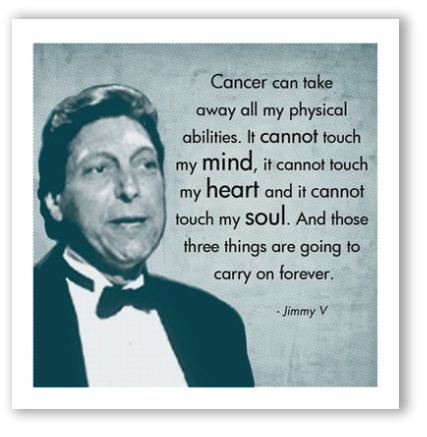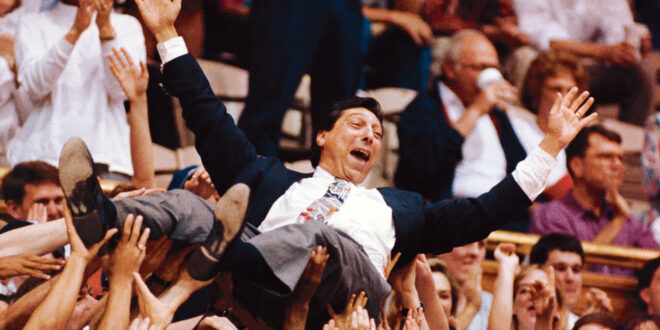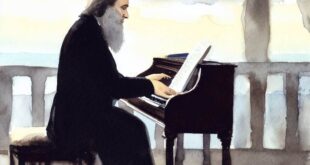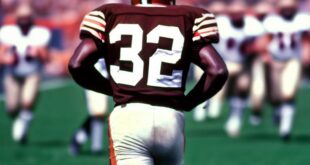Jim Valvano was the head coach of the North Carolina State Men’s Basketball Team when the won the NCAA National Title following the 1983 season (pictured above). After learning he was dying of cancer, his 1993 ESPY acceptance speech became legendary. ESPN established “The V Foundation” that has since generated 100s of millions of dollars for cancer research. Born: March 10, 1946; Queens, New York; Died: April 28, 1993 (aged 47); Durham, North Carolina.
By Jim Valvano
“Thank you, Thank you very much. Thank you. That’s the lowest I’ve ever seen Dick Vitale since the owner of the Detroit Pistons called him in and told him he should go into broadcasting.
The I can’t tell you what an honor it is, to even be mentioned in the same breath with Arthur Ashe. This is something I certainly will treasure forever. But, as it was said on the tape, and I also don’t have one of those things going with the cue cards, so I’m going to speak longer than anybody else has spoken tonight. That’s the way it goes. Time is very precious to me. I don’t know how much I have left and I have some things that I would like to say. Hopefully, at the end, I will have said something that will be important to other people too.
But, I can’t help it. Now I’m fighting cancer, everybody knows that. People ask me all the time about how you go through your life and how’s your day, and nothing is changed for me. As Dick said, I’m a very emotional and passionate man. I can’t help it. That’s being the son of Rocco and Angelina Valvano. It comes with the territory. We hug, we kiss, we love. When people say to me how do you get through life or each day, it’s the same thing. To me, there are three things we all should do every day. We should do this every day of our lives. Number one is laugh. You should laugh every day. Number two is think. You should spend some time in thought. Number three is, you should have your emotions moved to tears, could be happiness or joy. But think about it. If you laugh, you think, and you cry, that’s a full day. That’s a heck of a day. You do that seven days a week, you’re going to have something special.
I rode on the plane up today with Mike Krzyzewski, my good friend and wonderful coach. People don’t realize he’s ten times a better person than he is a coach, and we know he’s a great coach. He’s meant a lot to me in these last five or six months with my battle. But when I look at Mike, I think, we competed against each other as players. I coached against him for fifteen years, and I always have to think about what’s important in life to me are these three things. Where you started, where you are and where you’re going to be. Those are the three things that I try to do every day. When I think about getting up and giving a speech, I can’t help it. I have to remember the first speech I ever gave.
I was coaching at Rutgers University, that was my first job, oh that’s wonderful (reaction to applause), and I was the freshman coach. That’s when freshmen played on freshman teams, and I was so fired up about my first job. I see Lou Holtz here. Coach Holtz, who doesn’t like the very first job you had? The very first time you stood in the locker room to give a pep talk. That’s a special place, the locker room, for a coach to give a talk. So my idol as a coach was Vince Lombardi, and I read this book called “Commitment To Excellence” by Vince Lombardi. And in the book, Lombardi talked about the fist time he spoke before his Green Bay Packers team in the locker room, and they were perennial losers. I’m reading this and Lombardi said he was thinking should it be a long talk, or a short talk? But he wanted it to be emotional, so it would be brief. So here’s what I did. Normally you get in the locker room, I don’t know, twenty-five minutes, a half hour before the team takes the field, you do your little x and o’s, and then you give the great Knute Rockne talk. We all do. Speech number eight-four. You pull them right out, you get ready. You get your squad ready. Well, this is the first one I ever gave and I read this thing. Lombardi, what he said was he didn’t go in, he waited. His team wondering, where is he? Where is this great coach? He’s not there. Ten minutes he’s still not there. Three minutes before they could take the field Lombardi comes in, bangs the door open, and I think you all remember what great presence he had, great presence. He walked in and he walked back and forth, like this, just walked, staring at the players. He said, “All eyes on me.” I’m reading this in this book. I’m getting this picture of Lombardi before his first game and he said “Gentlemen, we will be successful this year, if you can focus on three things, and three things only. Your family, your religion and the Green Bay Packers.” They knocked the walls down and the rest was history. I said, that’s beautiful. I’m going to do that. Your family, your religion and Rutgers basketball. That’s it. I had it. Listen, I’m twenty-one years old. The kids I’m coaching are nineteen, and I’m going to be the greatest coach in the world, the next Lombardi. I’m practicing outside of the locker room and the managers tell me you got to go in. Not yet, not yet, family, religion, Rutgers Basketball. All eyes on me. I got it, I got it. Then finally he said, three minutes, I said fine. True story. I go to knock the doors open just like Lombardi. Boom! They don’t open. I almost broke my arm. Now I was down, the players were looking. Help the coach out, help him out. Now I did like Lombardi, I walked back and forth, and I was going like that with my arm getting the feeling back in it. Finally I said, “Gentlemen, all eyes on me.” These kids wanted to play, they’re nineteen. “Let’s go,” I said. “Gentlemen, we’ll be successful this year if you can focus on three things, and three things only. Your family, your religion and the Green Bay Packers,” I told them. I did that. I remember that. I remember where I came from.
It’s so important to know where you are. I know where I am right now. How do you go from where you are to where you want to be? I think you have to have an enthusiasm for life. You have to have a dream, a goal. You have to be willing to work for it.
I talked about my family, my family’s so important. People think I have courage. The courage in my family are my wife Pam, my three daughters, here, Nicole, Jamie, LeeAnn, my mom, who’s right here too. That screen is flashing up there thirty seconds like I care about that screen right now, huh? I got tumors all over my body. I’m worried about some guy in the back going thirty seconds? You got a lot, hey va fa napoli, buddy. You got a lot.

I just got one last thing, I urge all of you, all of you, to enjoy your life, the precious moments you have. To spend each day with some laughter and some thought, to get you’re emotions going. To be enthusiastic every day and as Ralph Waldo Emerson said, “Nothing great could be accomplished without enthusiasm,” to keep your dreams alive in spite of problems whatever you have. The ability to be able to work hard for your dreams to come true, to become a reality.
Now I look at where I am now and I know what I want to do. What I would like to be able to do is spend whatever time I have left and to give, and maybe, some hope to others. Arthur Ashe Foundation is a wonderful thing, and AIDS, the amount of money pouring in for AIDS is not enough, but is significant. But if I told you it’s ten times the amount that goes in for cancer research. I also told you that five hundred thousand people will die this year of cancer. I also tell you that one in every four will be afflicted with this disease, and yet somehow, we seem to have put it in a little bit of the background. I want to bring it back on the front table. We need your help. I need your help. We need money for research. It may not save my life. It may save my children’s lives. It may save someone you love. And ESPN has been so kind to support me in this endeavor and allow me to announce tonight, that with ESPN’s support, which means what? Their money and their dollars and they’re helping me-we are starting the Jimmy V Foundation for Cancer Research. And its motto is “Don’t give up, don’t ever give up.” That’s what I’m going to try to do every minute that I have left. I will thank God for the day and the moment I have. If you see me, smile and give me a hug. That’s important to me too. But try if you can to support, whether it’s AIDS or the cancer foundation, so that someone else might survive, might prosper and might actually be cured of this dreaded disease. I can’t thank ESPN enough for allowing this to happen. I’m going to work as hard as I can for cancer research and hopefully, maybe, we’ll have some cures and some breakthroughs. I’d like to think, I’m going to fight my brains out to be back here again next year for the Arthur Ashe recipient. I want to give it next year!
I know, I gotta go, I gotta go, and I got one last thing and I said it before, and I want to say it again. Cancer can take away all my physical abilities. It cannot touch my mind, it cannot touch my heart and it cannot touch my soul. And those three things are going to carry on forever.
I thank you and God bless you all.”
Listen to Jim’s speech here, if you please.
Arthur Ashe Courage & Humanitarian Award Acceptance Address — delivered March 3, 1993




